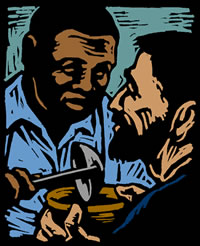
26th Sunday in Ordinary Time Year A
In the gospel of Matthew, Jesus has already warned his disciples three times that he is to suffer; and he has indicated that the chief priests and leaders of the people will be responsible for his death. The brief parable in today’s reading, addressed ‘to the chief priests and the elders’, reflects the growing confrontation with these authorities that will lead, in the end, to his death. He knows that, in their opposition to him, they see themselves as upholding the traditions of Israel - giving expression to their faithfulness to the Lord. His parable gently confronts them with their tragic miscalculation. In Matthew’s narrative, immediately before Jesus tells this parable, he was challenged by these leaders: what authority did he have for teaching in the Temple precincts? He showed up their hypocrisy, putting them in a dilemma - asking them what authority John the Baptist had when he preached to the people.
The simple story of the parable he now addresses to them ends with a question. His parables, we recall, were designed to leave the hearers pondering an unsettling question. Because the answer to the question he put to them is straight forward – the son who initially refused, and ‘afterwards thought better of it and went’, was the one who did the father’s will – the opponents of Jesus answered accordingly. But as they do so, they begin to realise what Jesus’ parable is driving at. As the defenders of the nation’s faith traditions, they see themselves as always saying ‘Yes’ to God. But now Jesus is inviting them to reflect that their actions may not match their professions of faithfulness. John the Baptist called the people to a conversion whereby they would be open to what was about to take place in the great plan of God. The very ones these leaders despised, as ‘outside the law’ – tax collectors, sinners, those whose busy lives and slender means made it impossible for them to observe all the rituals and customs they emphasised – were listening to the teaching of the one announced by the Baptist, while they themselves were intent on destroying him, not recognising that he came from God. The ironic lesson of the parable would have been very real to the Jewish converts of Matthew’s community.
The old proverb, ‘Actions speak louder than words’, reminds us of the inconsistencies that can be present in the lives of all of us. The parable of Jesus reminds us that these inconsistencies can be present in our Christian lives – when we see ourselves as fervent believers, always faithful to our devotions and religious observances, but with little practical expression to show of our following of Christ. St Paul’s exhortations to the Philippians in today’s reading provide simple but telling examples of the practical attitudes that true followers of Jesus should have: no competition or petty rivalry, putting the wellbeing of others before our own, being genuinely concerned to assist those around us. And, as always, Paul leads us back to the ultimate pattern of our life as disciples of the Lord – the Son who said ‘Yes’ to the Father, came to work in the God’s vineyard, setting aside his divine glory and making himself the Servant of us all. ‘In your attitudes you must be the same as Christ’.
Jesus may well have told the same parable in different forms. As we hear today’s brief parable we may well ask whether it is related to the great parable, in Luke’s gospel, of the wayward son who found his way back to his father’s love and welcome.
John Thornhill sm

